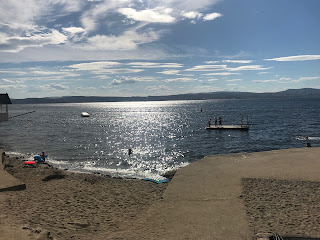The water is a warm 25 degrees Celsius at the moment in this Nordic heat wave - so perfect for Australians :)
This AirBnB is interesting, because I got a chance to learn about Norwegian families, from my host, and another local family who came over. Its hard for even a middle class family to make ends meet here. So, both parents have to work full-time. Groceries, and alcohol prices are astronomical, even for Norwegians, and petrol is twice the price at $120-$150 AUD to fill up the tank.
The big difference is that the Nordic countries don't have the low wage service sector that Australia or the United States has from high immigration- in other words - no cleaners, no nanny's, no Uber Eats/MenuLog (home food delivery), no cheap restaurants (its expensive to eat out here due to high wages) or prepared meals that are invaluable to keep working families functioning in Sydney or Melbourne. You don't want to know how much it costs to get nails or hair done! The labour market is not flexible, heavily unionised, and there are numerous legislative hurdles apparently. Norwegian authorities are trying to stop the cash economy (the grey economy - if you have hired a tradesman in Sydney you will understand this) that is the grease that often keeps Australian service sector running. You can't grow at roughly 3% for the last 26 years like the Australian economy has without migrants - inflation would have been through the roof like the bad old days, and the economy would have had another, 'recession we had to have' like in 1990.
Further information: I can highly George Megalogenis's book, Australia's Second Chance, on the contribution of skilled migration on Australia's economic success story and avoiding the GFC, - https://www.amazon.com/Australias-Second-Chance-George-Megalogenis-ebook/dp/B012NU15Y4/ref=nodl_
Having said all that we are talking about two different economic models. Australia has the Anglo-Saxon economic model, like the United States, and Norway has the Nordic economic model. The benefits of the Nordic economic model are that there is less social inequality, a broad social safety net, and the labour market, although inflexible, provides a living wage and protections for most workers. In conclusion its a mixture of capitalism and socialism that promotes equality, and quality of life. I noticed most Norwegians seem to love it, and are very nationalistic. However, from talking to Norwegians who have lived and worked, 'outside the bubble', they can see some of the limitations of the economic model.
To conclude, working mothers are often exhausted in Norway, from working full time, stressed from paying for high cost services, and running the households with or without a partner. Just a quick note, what I was talking about with inflation, is happening with the Norwegian economy - 2016 inflation was 3.55%, then 1.88% the following year, and forecast for 2% next year, although economic growth is only 1.9%. So, there is some data to back up the antidotal information I'm getting told that they are peddling harder and not getting ahead economically. This is also evidenced by the rising debt-income ratio that in 2016 was 235% or the third highest among OECD countries (see link below).
This is the dark side of the Scandinavian feminist utopia.
However, on a sunny day, all this is forgotten, at Fjellstrand beach. There is the obligatory floating pontoon like at Hellvik. There is also a diving board, and a rope to swing out on into the water. Everybody is having fun, as Northern Europe enjoys its hottest summer for decades.
As the sun slowly sets, I couldn't think of a better place to be than in beautiful Norway.
Further information:
George Megalogenis, Australia's Second Chance, available from Amazon at https://www.amazon.com/Australias-Second-Chance-George-Megalogenis-ebook/dp/B012NU15Y4/ref=nodl_
Michael Booth, The Almost Nearly Perfect People: Behind the Myth of the Scandinavian Utopia - https://www.amazon.com/Almost-Nearly-Perfect-People-Scandinavian/dp/1250081564/ref=nodl_
Norway's household debt problem - https://www.privatedebtproject.org/view-articles.php?The-Risks-of-Rising-Household-Debt-in-Norway-34



